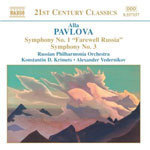
Symphonies Nos. 1 and 3
 $25.00
Out of Stock
$25.00
Out of Stock6+ weeks add to cart
ALLA PAVLOVA
Symphonies Nos. 1 and 3
Mikhail Adamovich (piano) / Valery Brill (cello) / Leonid Lebedev (flute) / Russian Philharmonia Orchestra / Alexander Vedernikov
[ Naxos / CD ]
Release Date: Tuesday 6 January 2004
This item is currently out of stock. It may take 6 or more weeks to obtain from when you place your order as this is a specialist product.
"Pavlova paints delicately with the unconventional ensemble, creating a sound-world simultaneously precise but also somehow suspended in dream."
(BBC Music)
"[The First] is a haunting elegy in a single movement. Although written for only 11 instruments, its expressive scale and remarkable sense of structure more than justify the title of symphony...Pavlova paints delicately with the unconventional ensemble, creating a sound-world simultaneously precise but also somehow suspended in dream."
(BBC Music)
Alla Pavlova is a composer and musicologist. In 1983 she received her Master's Degree at the Gnesin Academy of Music in Moscow. She studied composition with Armen Shakhbagian. From 1983 to 1986 she lived in the Bulgarian capital, Sofia, where she worked for the Union of Bulgarian Composers and the Bulgarian National Opera. She spent the years from 1986 to 1990 in Moscow, working for the Russian Musical Society Board, and since 1990 has lived in New York, where she is a member of New York Women Composers, Inc. Alla Pavlova has written a number of compositions for orchestra, including four symphonies, as well as other instrumental and vocal works that have been performed in the United States, Europe, and Canada. She has a special interest in writing music for film, dance, theatre, and children. Her articles, now numbering over a hundred, have appeared in Russian as well as international publications.
Symphony No. 1 'Farewell Russia', for chamber orchestra, was composed in October 1994, and is dedicated to Russia. It was first performed at the American Music Concert in Moscow on 30th May, 1995, in the Concert Hall of the Union of Russian Composers, and recorded the following day. It was written after the composer's trip to Moscow in July 1994, and is, in a way, a response to her impressions of the new realities of life in her native country, which she was visiting to participate in the concert of the New York Women Composers, Inc. The concert was dedicated to American Independence Day, and two of Alla Pavlova's compositions, Epitaph and Broadway's Song, were performed. Alla Pavlova had left Moscow and moved to America when Russia was still a Soviet state and a part of the Union of Soviet Socialist Republics. After several years away, in 1994 Moscow was unrecognisable and seemed to her a completely new, unfamiliar place where she had never been before. It was a period when the old, rigid Soviet structures were broken down, while the new ones had not been formed enough to provide some degree of stability. Among all her old friends in Moscow was a feeling of insecurity and depression, with no idea what the next day would bring. ' It was so painful for me to see that the country where we were born and brought up', she writes, 'where we had received our first, childish impressions of the world, where we were shaped and matured as individuals, that this country seemed no longer to exist'.
In an interview in April 1996 for the Morning Edition NPR on her music, Alla Pavlova stressed that the name of the symphony, Farewell Russia, expresses not only her personal feelings but, she believes, conveys the moods and thoughts of many people in Russia at that particular time of drastic changes in their society. She chose the title through her love for Russia, perhaps an idealised Russia of her own imagining.
The Symphony is written for a chamber orchestra consisting of eleven instruments, string quintet, two flutes, piccolo, harp, piano, vibraphone, and tam-tam. It is in a single extended movement, throughout which thoughts, moods, and memories develop and interplay. Alla Pavlova has referred to it as 'a symphony with piano solos', because it has three piano solos.
Symphony No. 3 was written in August and September 2000. The work is tonal and romantic in conception. For many years, Alla Pavlova lived in New York on Riverside Drive, near the monument of Joan of Arc. The music of the symphony was inspired by this monument, but has no further programme. It would be wrong to see this music as a musical narration of the story of Joan of Arc, or a psychological portrait. The symphony is a contemplation on the mission which every human being on earth has, a destiny, God's will, which leads to events, accomplishments, and actions that are at times unthinkable, and the life of Joan of Arc is a very strong example of this concept. This music is also contemplation on the purpose of one's life, on the power of beauty and simplicity, on joy, but at the same time the tragedy of being. 'It is my hope', the composer writes, 'that this music will provide support and inspiration to the listeners at difficult moments of their lives, and will strengthen their faith in their destiny and in the profound significance of a human life'. There is one other version of the symphony, a more traditional one, with slightly different instrumentation and without the guitar. The work is dedicated to the composer's mother.
- Keith Anderson
Tracks:
Paganiniana: Divertimento for Orchestra, Op. 65
Serenata for Chamber Orchestra, Op. 46bis
La Giara, Op. 41bis, Suite sinfonica

